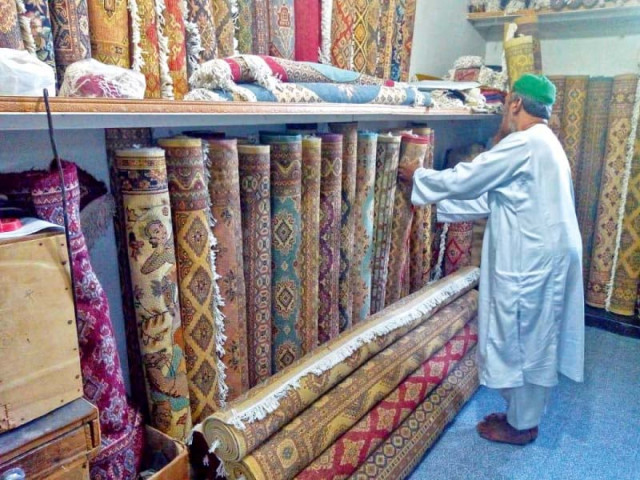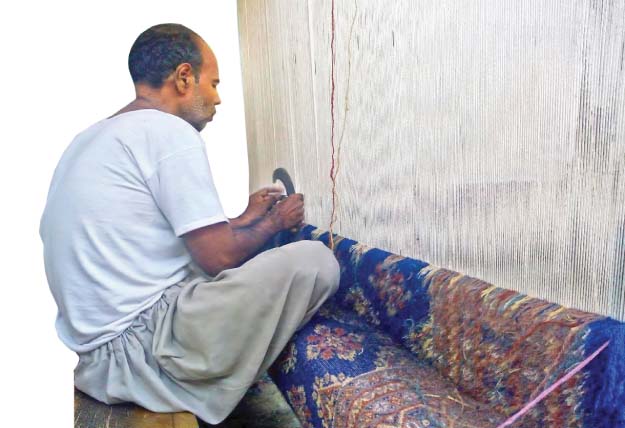With exports in gloom, Karachi’s carpet weavers abandon looms
Exports worth more than $450 million have slipped out of Pakistan’s hand and won by India in the past two decades

The labourers work under financial strain as an average carpet takes between a month and 45 days to prepare for which they get barely Rs10,000. PHOTOS: EXPRESS
At the local level, mostly Iranian carpets are prepared. Of the total cost, 75% is spent on workers while 25% is spent to purchase the material. As the prices of wool, silk and other necessary items used to prepare carpets have increased, the cost of production has also increased manifold. But, the wages of workers have remained stagnant.
Textile sector: Delay in competitive energy prices harms exports
Workers in a factory of Orangi Town said that they earned a daily wage of Rs250 for a 12-hour shift while the young and most hard-working workers drew a maximum of Rs350 per day. An average four by eight feet carpet takes between a month and 45 days to prepare, which means that the workers are hardly able to earn Rs10,000 a month. The workers said that many workers had stopped working as carpet makers because of the low pay. Most workers have switched over to garment factories or adopted other professions. According to these workers, the industry cannot be restored without raising the pay of the carpet-makers.
Orangi Town, Korangi, Landhi, Malir and other sparsely populated areas of Karachi had a number of cottage industries involved in carpet weaving, which along with the larger factories and exporters, made carpets at the household level. While traders have managed to continue despite the rising prices, many small enterprises have shut down.

International exhibitions
The large factories too, aren't faring well. Experts say that the participation of Pakistani exporters in traditional international exhibitions is very low. The Pakistan Carpet Manufacturers and Exporters Association Chairperson Naeem Sajid told The Express Tribune that international shows were an effective marketing platform to promote Pakistani carpets. But, he added, companies participating in them have to incur heavy expenditures. Apart from charges for stalls, a lot of money is spent on logistics which is beyond the reach of not just the small-sized exporters, but also the medium-sized exporters, he said.
Sajid said that while the government provides a few financial concessions to its carpet industry in important trade fairs, the Indian government is heavily investing in promoting its industry. In fact, the Indian government also provides concession for daily expenditures like boarding and lodging.
There are also other reasons why India has managed to capture the international market.
Competitive India
Exports worth more than USD450 million have slipped out of Pakistan's hand and won by India in the past two decades. One of the reasons for this is that Pakistan has been unable to keep up with changing trends. The industry continues to focus on traditional carpets while India has managed to adopt modern patterns in its designs. The carpet exports by India were 1.430 billion dollars in 2017-2018 wherein United States of America, Germany, United Kingdom Australia and United Arab Emirates remained its largest buyers. On the other hand, the carpet exports from Pakistan remained restricted to USD75 million in the last financial year.
Pakistani artist’s work auctioned for Rs34 million in London
Ambiente, the second most important fair held in Germany, is the largest annual fair of interior designs and decorators in which modern imagination of carpets and its designs and products are introduced. While 46 carpet companies of India are participating in the fair, as of now no Pakistani company has signed up for occasion.
The strain in Pakistan's relationship with India and Afghanistan has further brought down the business of local traders. The Afghan refugees in Karachi used to make carpets for the local industry, but now they conduct their business through India.
The way forward
The art of carpet weaving is diminishing. Muhammad Saleem said that traders at the local level who sell readymade carpets were slowly winding up their business. There were more than 200 shops selling carpets in the handicraft market and other markets of Saddar but now 70% of them of have closed down. Saleem was also intent on winding up his business.
This art, which has become rare in Karachi and is almost extinct in other cities of Sindh, is struggling to survive in Punjab. Sajid said that the while it was not possible to immediately restore falling exports, Pakistan could take advantage of China-Pakistan Economic Corridor and access the Chinese market. He added that if government support was provided, then the lost art could not only become popular again but the lost market for exports could also be rediscovered.
Published in The Express Tribune, November 21st, 2018.



















COMMENTS
Comments are moderated and generally will be posted if they are on-topic and not abusive.
For more information, please see our Comments FAQ